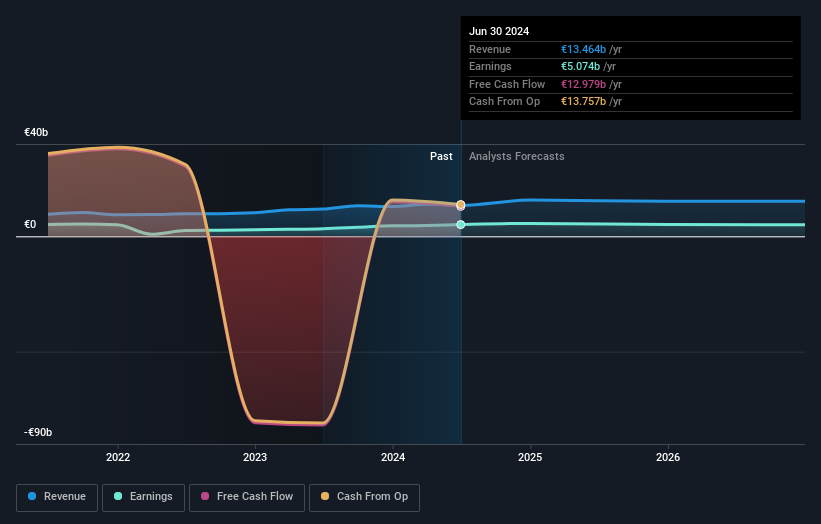CaixaBank, S.A.'s (BME:CABK) largest shareholders are private companies who were rewarded as market cap surged €1.2b last week

Key Insights
- CaixaBank's significant private companies ownership suggests that the key decisions are influenced by shareholders from the larger public
- A total of 2 investors have a majority stake in the company with 51% ownership
- Institutions own 20% of CaixaBank
A look at the shareholders of CaixaBank, S.A. (BME:CABK) can tell us which group is most powerful. And the group that holds the biggest piece of the pie are private companies with 51% ownership. Put another way, the group faces the maximum upside potential (or downside risk).
As a result, private companies were the biggest beneficiaries of last week’s 3.3% gain.
Let's take a closer look to see what the different types of shareholders can tell us about CaixaBank.
Check out our latest analysis for CaixaBank

What Does The Institutional Ownership Tell Us About CaixaBank?
Many institutions measure their performance against an index that approximates the local market. So they usually pay more attention to companies that are included in major indices.
CaixaBank already has institutions on the share registry. Indeed, they own a respectable stake in the company. This can indicate that the company has a certain degree of credibility in the investment community. However, it is best to be wary of relying on the supposed validation that comes with institutional investors. They too, get it wrong sometimes. If multiple institutions change their view on a stock at the same time, you could see the share price drop fast. It's therefore worth looking at CaixaBank's earnings history below. Of course, the future is what really matters.

CaixaBank is not owned by hedge funds. Fundación Bancaria Caixa d'Estalvis i Pensions de Barcelona, la Caixa is currently the company's largest shareholder with 33% of shares outstanding. Meanwhile, the second and third largest shareholders, hold 18% and 5.2%, of the shares outstanding, respectively.
After doing some more digging, we found that the top 2 shareholders collectively control more than half of the company's shares, implying that they have considerable power to influence the company's decisions.
While it makes sense to study institutional ownership data for a company, it also makes sense to study analyst sentiments to know which way the wind is blowing. There are a reasonable number of analysts covering the stock, so it might be useful to find out their aggregate view on the future.
Insider Ownership Of CaixaBank
The definition of an insider can differ slightly between different countries, but members of the board of directors always count. Company management run the business, but the CEO will answer to the board, even if he or she is a member of it.
I generally consider insider ownership to be a good thing. However, on some occasions it makes it more difficult for other shareholders to hold the board accountable for decisions.
Our information suggests that CaixaBank, S.A. insiders own under 1% of the company. But they may have an indirect interest through a corporate structure that we haven't picked up on. As it is a large company, we'd only expect insiders to own a small percentage of it. But it's worth noting that they own €7.7m worth of shares. It is good to see board members owning shares, but it might be worth checking if those insiders have been buying.
General Public Ownership
The general public, who are usually individual investors, hold a 29% stake in CaixaBank. While this group can't necessarily call the shots, it can certainly have a real influence on how the company is run.
Private Company Ownership
Our data indicates that Private Companies hold 51%, of the company's shares. It might be worth looking deeper into this. If related parties, such as insiders, have an interest in one of these private companies, that should be disclosed in the annual report. Private companies may also have a strategic interest in the company.
Next Steps:
I find it very interesting to look at who exactly owns a company. But to truly gain insight, we need to consider other information, too. For example, we've discovered 2 warning signs for CaixaBank (1 shouldn't be ignored!) that you should be aware of before investing here.
If you would prefer discover what analysts are predicting in terms of future growth, do not miss this free report on analyst forecasts.
NB: Figures in this article are calculated using data from the last twelve months, which refer to the 12-month period ending on the last date of the month the financial statement is dated. This may not be consistent with full year annual report figures.
New: AI Stock Screener & Alerts
Our new AI Stock Screener scans the market every day to uncover opportunities.
• Dividend Powerhouses (3%+ Yield)
• Undervalued Small Caps with Insider Buying
• High growth Tech and AI Companies
Or build your own from over 50 metrics.
Have feedback on this article? Concerned about the content? Get in touch with us directly. Alternatively, email editorial-team (at) simplywallst.com.
This article by Simply Wall St is general in nature. We provide commentary based on historical data and analyst forecasts only using an unbiased methodology and our articles are not intended to be financial advice. It does not constitute a recommendation to buy or sell any stock, and does not take account of your objectives, or your financial situation. We aim to bring you long-term focused analysis driven by fundamental data. Note that our analysis may not factor in the latest price-sensitive company announcements or qualitative material. Simply Wall St has no position in any stocks mentioned.
About BME:CABK
CaixaBank
Provides various banking products and financial services in Spain and internationally.
Established dividend payer and good value.
Similar Companies
Market Insights
Community Narratives



